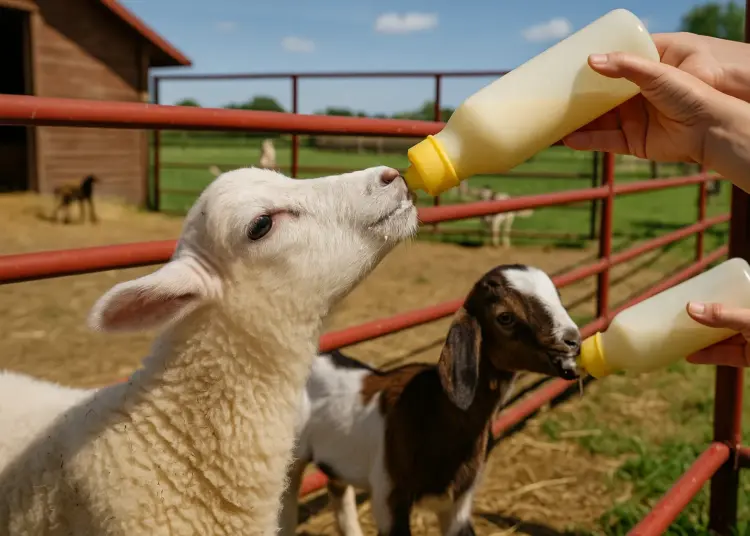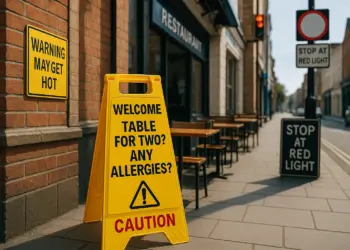Story Highlight
– Farm owner fined £8,000 after illness outbreak.
– 264 people contracted cryptosporidiosis linked to farm visit.
– Inadequate facilities and supervision contributed to outbreak.
– Serious psychological impact reported among victims.
– Health authorities emphasize risk management for farm visits.
Full Story
A farm proprietor on the Isle of Wight has been subjected to a fine of £8,000 following an outbreak of a serious gastrointestinal illness that affected over 260 individuals, largely due to an activity involving animal feeding on her premises earlier this year.
Sharon Wheeler, the owner of Hazelgrove Farm located in Ryde, admitted to violating Section 3(2) of the Health and Safety at Work etc. Act 1974 during court proceedings. The infectious outbreak, identified as cryptosporidiosis, was attributed to the zoonotic parasite cryptosporidium, which was linked to a specific event held from April to May 2023 where families were invited to feed lambs and young goats.
An investigation carried out by the Health and Safety Executive (HSE) in conjunction with the UK Health Security Agency (UKHSA) revealed that approximately 2,400 tickets were sold for this activity over a span of less than a month. The outbreak predominantly affected children, with reports indicating that over half of the infections were among young visitors.
Investigators discovered numerous deficiencies at the farm that contributed to the outbreak. These included a significant lack of proper handwashing facilities and inadequate supervision during the animal feeding sessions. Furthermore, the risk assessments conducted were found lacking, and the information provided to both staff and visitors fell short of what was necessary to ensure safety.
Eyewitnesses observed children engaging with the animals, some of which were visibly dirty, including instances of contact with faeces. This direct interaction was a critical factor in the transmission of the parasite, resulting in 264 attendees falling ill, with approximately 5% of those requiring hospital treatment due to severe symptoms.
The psychological impact of this outbreak was also highlighted during the court session. District Judge Galloway presented statements from victims, indicating the serious nature of their experiences. He noted the considerable psychological burden, with many expressing feelings akin to post-traumatic stress disorder as a consequence of the illness. The judge remarked on the substantial fears of parents concerning their children’s health and recovery, as well as the debilitating nature of the symptoms, which many described as the worst gastrointestinal distress they had ever experienced.
The aftermath of the outbreak had significant ramifications, with reports indicating that 1,254 work and school days were lost as a result of the illness. An alarming number of those affected have continued to experience lingering gastrointestinal complications.
Following the court decision, HSE inspector Francesca Arnold emphasised the critical importance of proper risk management for farmers welcoming visitors to their properties. She stated, “It is extremely important that farmers understand the risks on their farm,” urging that adequate measures be put in place to safeguard the wellbeing of visitors.
Arnold further addressed the inherent risks posed by farm visits, making it clear that while dangerous situations can never be completely eliminated, they can be mitigated through the implementation of effective control measures and safe practices. This approach not only ensures the safety of workers and guests but also allows for the continuation of recreational and educational activities, which are vital for community engagement and awareness.
The incident at Hazelgrove Farm has raised broader concerns regarding farm safety regulations and the need for rigorous enforcement of health and safety standards in rural attractions. With the popularity of farm visits booming, it is crucial for farm owners to ensure that they are not only promoting positive educational experiences but are also fully compliant with health and safety regulations.
As families seek outdoor activities, particularly in rural settings, the onus remains on farm operators to create a safe environment for their visitors. The lessons learned from this unfortunate outbreak at Hazelgrove Farm may serve as a crucial reminder of the importance of health and safety compliance, particularly in the context of zoonotic diseases, which can have far-reaching implications for public health.
As the community reflects on the impact of this outbreak, it becomes increasingly clear that safety should always be prioritised, ensuring that visitors can safely experience the joys of farm activities without falling victim to preventable illnesses in the future.
Our Thoughts
The outbreak of cryptosporidiosis at Hazelgrove Farm highlights critical lapses in health and safety practices. To prevent such incidents, the farm owner could have implemented enhanced hygiene measures, particularly adequate handwashing facilities for visitors. Regular and robust risk assessments must be conducted, as required under the Management of Health and Safety at Work Regulations 1999, to identify and mitigate risks associated with animal interactions.
The lack of supervision and insufficient information for both staff and visitors contravened obligations under Section 3(2) of the Health and Safety at Work etc. Act 1974, as it mandates ensuring the health and safety of non-employees. Education on zoonotic diseases should have been provided, particularly concerning safe practices around animals.
To prevent similar incidents, it is essential that farms have contingency plans for zoonotic disease outbreaks and conduct training for staff on hygiene protocols and visitor supervision. Regular health and safety audits can help ensure compliance with regulations and promote a safer environment for both visitors and animals on farms.























This incident is a stark reminder that attractions with animal contact must have robust hygiene and supervision measures in place. Adequate handwashing facilities, clear supervision during feeding sessions and effective cleaning protocols are basic but essential controls to prevent zoonotic infections. Risk assessments should be kept up to date and must drive practical measures such as limiting direct contact where necessary, providing visible staff oversight and ensuring visitors are informed about the risks and required precautions. Enforcement action in cases like this is necessary to reinforce standards and protect vulnerable visitors, especially children.
This incident is a stark reminder that visitor safety must be the top priority at all public attractions. Proper risk assessments, clear hygiene procedures and adequate supervision during animal interactions are essential to prevent infections such as cryptosporidiosis. Farms open to the public need appropriate handwashing facilities, staff trained to enforce hygiene and well managed animal feeding sessions to protect vulnerable visitors, especially children. Enforcement action in cases of serious failings helps reinforce standards and protect public confidence in rural attractions.
This incident highlights the critical need for robust risk management at visitor attractions. Farms open to the public must provide adequate handwashing facilities, clear supervision during animal contact and effective staff training on infection control. Regular risk assessments and prompt corrective action when deficiencies are found are essential to protect vulnerable visitors, particularly children. Enforcement action here underlines that failure to manage known biological hazards can have serious health and legal consequences.
This incident is a stark reminder that basic hygiene and adequate supervision at visitor attractions are not optional. Farms open to the public must provide effective handwashing facilities, clear guidance on animal contact, and sufficient staff to manage interactions, especially during feeding times. Risk assessments must be practical and acted on, and owners need to ensure staff are trained to enforce controls and support sick visitors. Children are particularly vulnerable so extra precautions are essential. Enforcement and visible accountability are important to drive improvements and prevent similar outbreaks.